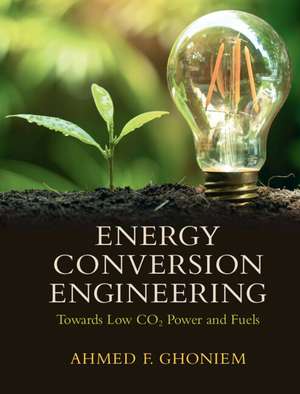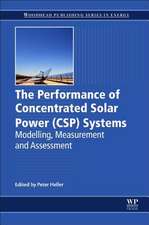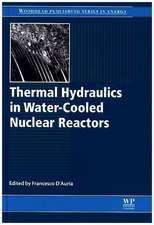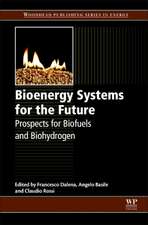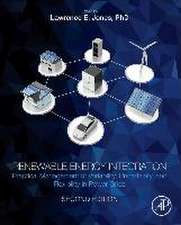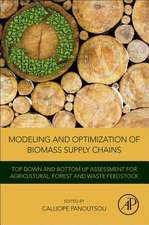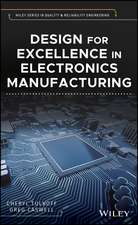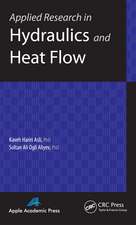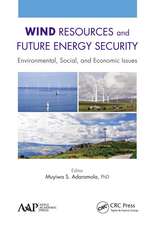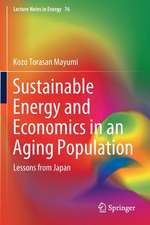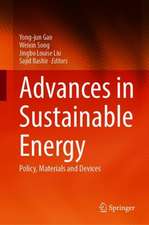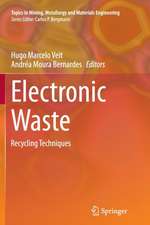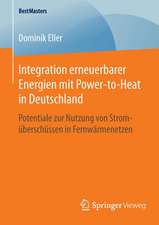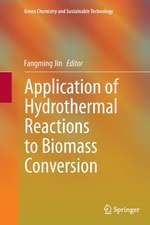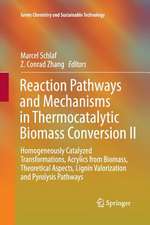Energy Conversion Engineering: Towards Low CO2 Power and Fuels
Autor Ahmed F. Ghoniemen Limba Engleză Hardback – 10 noi 2021
Preț: 543.27 lei
Preț vechi: 590.51 lei
-8% Nou
Puncte Express: 815
Preț estimativ în valută:
103.97€ • 112.89$ • 87.33£
103.97€ • 112.89$ • 87.33£
Carte disponibilă
Livrare economică 01-15 aprilie
Livrare express 15-21 martie pentru 82.18 lei
Preluare comenzi: 021 569.72.76
Specificații
ISBN-13: 9781108478373
ISBN-10: 1108478379
Pagini: 1000
Dimensiuni: 194 x 252 x 42 mm
Greutate: 1.91 kg
Ediția:Nouă
Editura: Cambridge University Press
Colecția Cambridge University Press
Locul publicării:Cambridge, United Kingdom
ISBN-10: 1108478379
Pagini: 1000
Dimensiuni: 194 x 252 x 42 mm
Greutate: 1.91 kg
Ediția:Nouă
Editura: Cambridge University Press
Colecția Cambridge University Press
Locul publicării:Cambridge, United Kingdom
Cuprins
Preface; 1. Low carbon energy: Why?; 2. Thermodynamics; 3. Chemical thermodynamics; 4. Electrochemical thermodynamics; 5. Gas turbine cycles; 6. Rankine cycles; 7. Fuel cells at finite current; 8. Combined, oxy-combustion and hybrid cycles; 9. Solar thermal, geothermal and integration; 10. Gas separation; 11. Carbon capture cycles: natural gas; 12. Coal power cycles, gasification and synfuels; 13. Carbon capture cycles: coal; 14. Biomass; Index.
Recenzii
'An outstanding textbook and reference, spanning fundamentals to real-world devices. This book will guide the next generation of engineers who are realizing the low-carbon energy transition.' Timothy Lieuwen, Georgia Institute of Technology
'A comprehensive toolkit for understanding, evaluating, and comparing conventional and evolving new energy systems in terms of their engineering performance and environmental impacts and benefits. It is a must-read for students and researchers interested in designing and modeling energy technologies to meet today's low-carbon-emitting and other sustainability objectives.' Jefferson Tester, Cornell University
'Professor Ghoniem draws from decades of research expertise and teaching experience at MIT in the field of energy conversion. This timely textbook covers both the fundamentals of thermodynamics and real-world applications of cutting-edge clean energy systems to equip the next generation of students to design, analyze, and optimize low-carbon and zero-carbon energy systems for a sustainable future.' Katherine Hornbostel, University of Pittsburgh
'This book provides a holistic view of energy conversion systems by discussing conventional concepts as well as emerging technologies, all of which are connected by fundamental energy conversion principles. I truly believe that readers can envision a bright pathway toward sustainable power generation with low environmental impact.' Jongsup Hong, Yonsei University
'An excellent, up-to-date, and comprehensive textbook and reference in energy conversion. It provides a practical and fresh perspective on the subject, which is nicely complemented with chapters addressing clean energy conversion and strategies to control CO2 emissions. This book is a must-have reference for anyone interested in the subject of energy conversion.' Tarek Echekki, North Carolina State University
'This book is systematically developed, very well organized, and well written. The coverage in all 14 chapters is comprehensive, with example problems and additional problems at the end of each chapter. It is a timely book as we seek innovative solutions for clean energy production at higher efficiency, with due considerations given to environmental pollution, including CO2. I enthusiastically endorse this book.' Ashwani K. Gupta, University of Maryland
'A comprehensive toolkit for understanding, evaluating, and comparing conventional and evolving new energy systems in terms of their engineering performance and environmental impacts and benefits. It is a must-read for students and researchers interested in designing and modeling energy technologies to meet today's low-carbon-emitting and other sustainability objectives.' Jefferson Tester, Cornell University
'Professor Ghoniem draws from decades of research expertise and teaching experience at MIT in the field of energy conversion. This timely textbook covers both the fundamentals of thermodynamics and real-world applications of cutting-edge clean energy systems to equip the next generation of students to design, analyze, and optimize low-carbon and zero-carbon energy systems for a sustainable future.' Katherine Hornbostel, University of Pittsburgh
'This book provides a holistic view of energy conversion systems by discussing conventional concepts as well as emerging technologies, all of which are connected by fundamental energy conversion principles. I truly believe that readers can envision a bright pathway toward sustainable power generation with low environmental impact.' Jongsup Hong, Yonsei University
'An excellent, up-to-date, and comprehensive textbook and reference in energy conversion. It provides a practical and fresh perspective on the subject, which is nicely complemented with chapters addressing clean energy conversion and strategies to control CO2 emissions. This book is a must-have reference for anyone interested in the subject of energy conversion.' Tarek Echekki, North Carolina State University
'This book is systematically developed, very well organized, and well written. The coverage in all 14 chapters is comprehensive, with example problems and additional problems at the end of each chapter. It is a timely book as we seek innovative solutions for clean energy production at higher efficiency, with due considerations given to environmental pollution, including CO2. I enthusiastically endorse this book.' Ashwani K. Gupta, University of Maryland
Notă biografică
Descriere
Discover the fundamentals and tools needed to model, design, and build efficient, clean low-carbon energy systems with this unique textbook.
